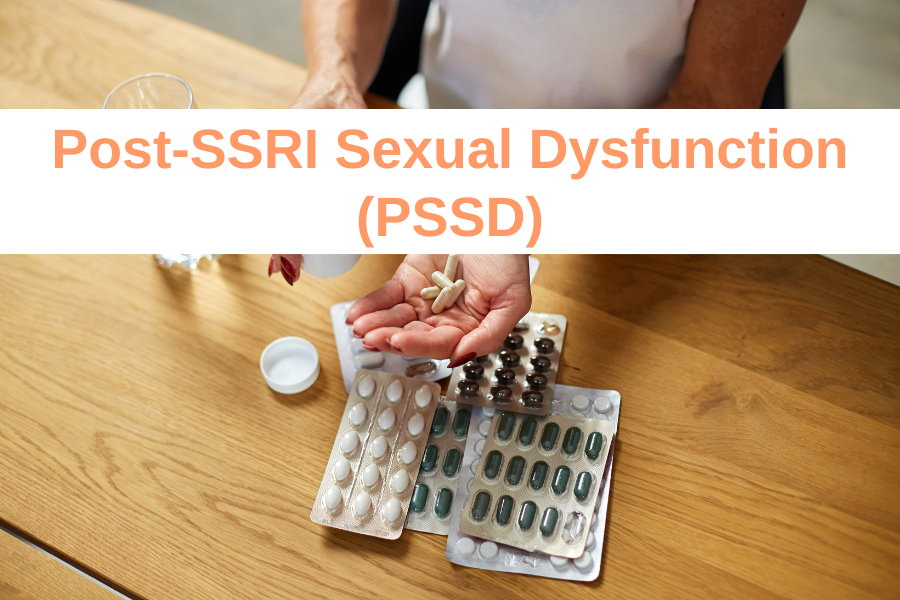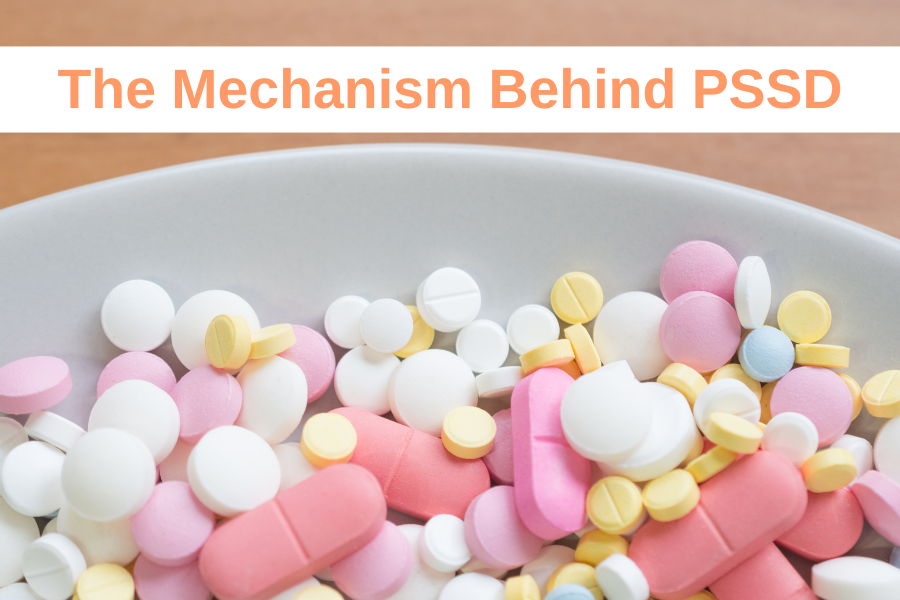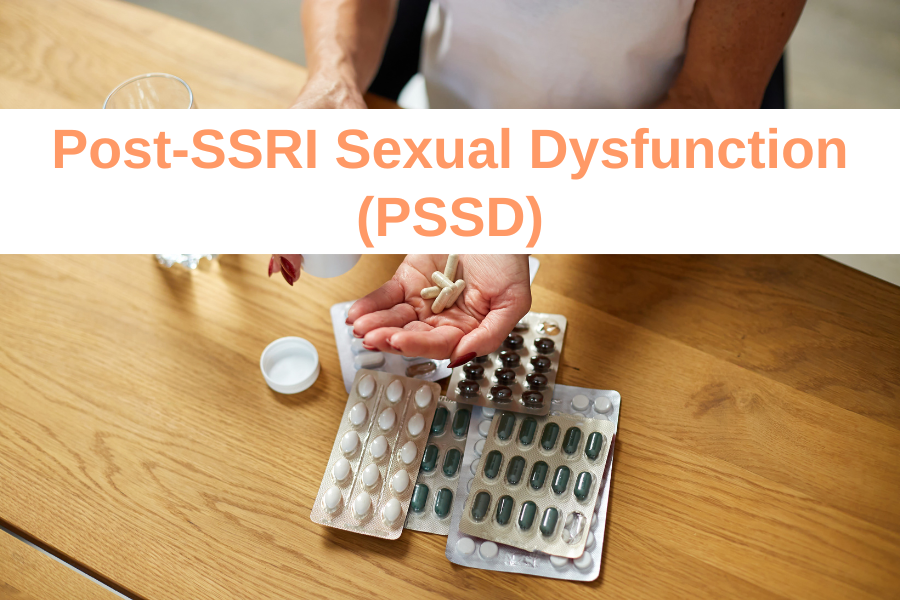When we talk about antidepressants, we often focus on the benefits—and rightly so. For many people, these medications can be life-saving, offering a way out of the fog of depression and anxiety.
But what happens when the meds that are supposed to help end up causing lasting harm?
One of the most concerning yet under-discussed is Post-SSRI Sexual Dysfunction (PSSD).

First, I want to be clear: this blog isn’t about questioning the value of antidepressants. It’s about bringing attention to a serious and often overlooked side effect.
I believe that understanding the full picture, both the benefits and the risks, helps people make informed decisions about their health. And that’s something everyone deserves.
Never heard of PSSD? Or maybe you’ve come across it but didn’t know much? You’re in the right place to learn more.
It’s underrecognized, underresearched, and, for those who experience it, incredibly isolating. In this post, we’ll explore what PSSD is, what the latest research says, and why centering patient voices is more important than ever.
Let’s get into it.
What Is Post-SSRI Sexual Dysfunction (PSSD)?
Post-SSRI Sexual Dysfunction (PSSD) is a serious and often long-lasting condition that can occur after discontinuing selective serotonin reuptake inhibitors (SSRIs), a common class of antidepressants used to treat depression and anxiety. While SSRIs are known to cause sexual side effects during treatment, what sets PSSD apart is its persistence long after the medication is discontinued, sometimes for years.
This lingering dysfunction has raised significant concerns in both psychiatric and pharmacological communities.

Understanding the Mechanism Behind PSSD
The precise mechanism of Post-SSRI Sexual Dysfunction (PSSD) remains unclear, but emerging research and patient experiences suggest several possible explanations:
- Desensitization or damage to serotonin (5-HT1A) receptors in both the central and peripheral nervous systems.
- Disruption in dopamine and nitric oxide pathways, which are vital for sexual arousal and orgasm.
- Peripheral nerve dysfunction, especially in genital sensory nerves.
- Epigenetic changes, potentially altering long-term gene expression involved in sexual response.
SSRIs work by increasing serotonin levels through reuptake inhibition in the brain, a mechanism that can improve mood but often suppresses sexual function, including reduced libido, delayed orgasm, and genital numbness.
In the case of PSSD, this suppression doesn’t resolve after stopping the medication, suggesting a potential “locked-in” neurochemical change that persists long-term.
Common Symptoms of PSSD
Individuals with Post-SSRI Sexual Dysfunction (PSSD) report a range of debilitating symptoms, including:
- Genital numbness or anesthesia
- Loss of libido
- Erectile dysfunction or vaginal dryness
- Inability to orgasm (anorgasmia)
- Emotional flatness or blunting
- Reduced genital blood flow and arousal response

Evidence and Recent Studies on PSSD
While PSSD is still under-recognized in mainstream medicine, several recent studies are bringing it into sharper focus:
1. Gargul & Pastwa-Wojciechowska (2024) – This case study collection underscores the diverse experiences of individuals with PSSD. While some patients reported gradual improvement, many continued to suffer long-term symptoms with considerable psychological distress. The authors emphasize the limited scientific understanding of PSSD and call for more systematic research, particularly clinical trials to investigate its pathogenesis and identify effective treatments. (Source)
2. Yu et al. (2024) – A large FDA pharmacovigilance study found sexual dysfunction was most commonly reported with SSRIs like paroxetine and fluoxetine, with indications of persistence in some cases. The study also identified serotonin receptor-related effects (5-HT1B, 5-HT2A) and called for further clinical validation. (Source)
3. Min & Alemi (2025) – This study highlights the disproportionate prescription of SSRIs to younger populations, raising concerns about increased exposure to potential long-term side effects like PSSD. (Source)
4. Truong et al. (2025) – This review examines how caffeine can alter SSRI pharmacokinetics, potentially extending their effects. While not focused on persistent side effects, it suggests external factors like caffeine may influence antidepressant duration and intensity. (Source)
Interpretations & Clinical Implications
- PSSD is increasingly recognized but still lacks diagnostic clarity and treatment pathways.
- Many diagnoses are made by exclusion due to a lack of specific biomarkers.
- Case reports and small studies suggest neuroadaptive or epigenetic changes may play a role.
- There’s a pressing need for research into neuroregenerative therapies, immunological connections, and biomarkers for early detection.
A Patient’s Perspective: Two Decades with PSSD
A powerful personal story published on Mad in America titled Two Decades of PSSD: A Life Stolen by Antidepressants provides crucial insight into what living with Post-SSRI Sexual Dysfunction (PSSD) is truly like.

In it, the author shares a deeply personal journey that began at age 14, after being prescribed Zoloft following the loss of a grandparent.
What followed was a decade-long struggle with persistent symptoms including emotional numbness, sexual dysfunction, cognitive impairment, and chronic fatigue even after discontinuing the medication.
Perhaps most disheartening was the repeated dismissal by medical professionals unfamiliar with PSSD.
Determined to find answers, the author began self-research, experimenting with countless supplements and treatments, and eventually joined a community-led research initiative.
Together, they compiled patient data and uncovered potential links to autoimmune responses, small fiber neuropathy, and neuroinflammation, shedding light on the complex biological roots of this condition.
A Glimpse at the Systemic Failures
The article (personal story) mentioned above shared how the medical system often fails patients with complex conditions like PSSD. Patients often face:
- A lack of recognition from mainstream medicine
- Dismissal of symptoms as psychosomatic
- Overreliance on pharmaceutical narratives
- Minimal funding or support for innovative research

Many patients report being invalidated, gaslit, or told their symptoms are psychosomatic. This systemic denial has led to years of suffering for countless individuals.
The bigger question: Why isn’t more being done?
A recurring theme is that psychiatry often relies on outdated models and rigid treatment protocols. Profit-driven incentives and a lack of curiosity stifle innovation and delay urgently needed research.
It’s time we move beyond pharmaceutical loyalty and start listening to patients. The answer to complex conditions like PSSD might not be a new pill—but rather, an open mind.

Patients as Advocates for Change
One of the most powerful messages from this narrative is the role patients can play in driving medical progress, particularly for poorly understood conditions like Post-SSRI Sexual Dysfunction (PSSD).
Patients Can:
- Raise awareness through advocacy and storytelling
- Contribute to grassroots research efforts
- Bridge the gap between lived experience and clinical knowledge
- Inform medical education, pushing for inclusion of emerging, under-recognized conditions in healthcare training
✅ Final Thoughts: A Call for Compassion and Curiosity
Post-SSRI Sexual Dysfunction (PSSD) is “real” and a devastating condition that deserves far more attention than it currently receives. While SSRIs remain an essential tool for managing mental health, patients must be given transparent information about the risks, including persistent side effects like PSSD.
As the conversation grows, so does hope for recognition, for research, and for healing.

This post is all about Post-SSRI Sexual Dysfunction (PSSD).
+ show Comments
- Hide Comments
add a comment